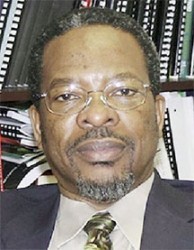United States- based Guyanese professor of political science Dr. Ivelaw Griffith, who is also a specialist on Caribbean security issues, held a two-hour interactive session with Members of Parliament on crime in Guyana on Tuesday.
Among the issues raised during the session were diplomatic resources, poverty, wealth, policing, and the family and their relationship to criminality and national security.
Though the turnout was poor–14 representatives from the three parliamentary parties were present—the discussion was lively and based on the points raised all the contributors saw crime as a major concern in Guyana and which could be tackled from various angles.

Griffith, who wrapped up a two-day visit on Tuesday organized by the US State Department, was headed to Trinidad to not only have conversations on national security and regional security matters but to talk about ways in which his university, Fort Valley State University, the University of the West Indies and the University of Guyana can build partnerships that are beneficial to all in the region.
Griffith, in his introduction, made it clear that he would not be making a presentation but would rather be engaging in a “conversation.” He said that often politicians are so caught up in the issues of the moment that there are not many opportunities available for them to take off their “hats” and focus on the broader challenges facing the nation.
At the beginning of the session he asked each parliamentarian to choose a word or draw a picture which would best describe the security situation in Guyana. Trevor Williams of the AFC opened the conversation. He chose the word resources and was asked to look at its relationship to security challenges and opportunities. He explained that he sees resources as having to do with institutional capacity and resources as being a problem to adequately monitor and to keep up to date with what is happening.
APNU MP Rupert Roopnaraine spoke about the various challenges Guyana has had with its three neighbours. For him, there needs to be a strengthening of diplomatic resources in relation to border security and he said he believed that it was an issue that should be included in the discussions.
Griffith, in touching on this topic, questioned how military, non-military and other partnerships can be built to ensure that there is a balanced national interest in a society. He said too that one should examine what role the private sector has to play in bringing forth some of those resources to enable the society to meet those challenges.
Joe Hamilton, PPP/C MP, raised ethnicity and the role of parents as issues. He said that often when crime is committed by one ethnic group, the society tries to downplay and to find an excuse as to what might be responsible. He said that when that crime is committed by another ethnic group, the society speaks about how evil and despicable that person is. He noted too that often crime and criminality are blamed on poverty, the school system, home affairs, and security personnel but “no one brings into play the issue of the parent who has brought these children into the world.”
Roopnaraine made the point that the increasing disparity between the very rich and the very poor is a “recipe for criminality and unrest.” He said that in his mind “poverty in many instances is frankly the mother of crime.” He said that when you deal with poverty, it is important that you deal with its companion, which is wealth.
AFC MP Cathy Hughes said that policing should be added to the conversation in terms of looking at the police’s role as enforcers of the law and how it relates to the administration of justice in Guyana. She said that this brings with it public confidence in the system.
Vanessa Kissoon, APNU MP, said the protection of rights of citizens is important, availability of resources, knowledge and education, and the country’s ability to negotiate and its ability to build partnerships.
Also making contributions were Valarie Garrido-Lowe of the AFC along with Chris Jones and Rennis Morian of APNU.
Also in attendance at the meeting was US Ambassa-dor D. Brent Hardt.







